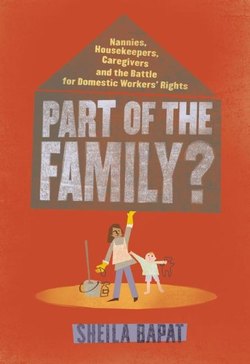Читать книгу Part of the Family? - Sheila Bapat - Страница 7
На сайте Литреса книга снята с продажи.
ОглавлениеFOREWORD
A book that tells us the story of domestic workers is a victory in itself, because it gives overdue recognition to a forgotten sector of the labor force. It speaks against the marginalization of those workers and says, “Don’t forget!” As American labor movements have won rights for other workers, domestic employees have historically been left behind. Their work is often devalued as menial. It is work that is unrecognized in the context of families and in the labor market. To win rights for domestic workers means to go up against the triple threat of class, race and gender barriers. To the modern equivalents of the upper crust we see in Downton Abbey, domestic work should be out of sight and out of mind. It is denigrated as the duty (not even real work) of women and is generally the employment realm of immigrants and women of color. We see the extreme form of this dehumanization in a celebrated case in which a diplomat in New York left the country, rather than face accusations that she underpaid and abused a nanny.
When I worked with the National Domestic Workers Alliance to write a Domestic Workers Bill of Rights for California, I knew I was going up against this kind of mindset. Too many people didn’t understand why these workers should be brought under the umbrella of worker protections. I took inspiration from the New York version of the Domestic Worker Bill of Rights. We kept on with the valiant support of people like Sen. Kevin de León, whose mother rode the bus to clean houses when he was a boy, and institutions like the New York Times, which spoke up for these rights.
I knew how underpaid these women are. Many have wages that don’t even work out to minimum wage. I was struck to hear that in many of their households, there is not enough money to keep food in the house all month long. They have to come to work sick and don’t get time off to see a doctor. Nearly a quarter of them have been fired for calling in sick.
Despite the support, and despite the overwhelming need, our bill faced nasty attacks. It was mischaracterized as a “babysitter” bill. There were scare tactics aimed at disabled employers of care workers. There was an industry that wanted to maximize profits by keeping pay low. We worked for two years, only to have the bill vetoed at the last minute in 2012. It was a shock to me, and a terrible slap to the workers who advocated to bring the bill to the Governor’s desk. I immediately committed to coming back with a new bill. The next time around, we prevailed and convinced the Governor to sign a bill for overtime pay, thanks in large part to high-profile women like Amy Poehler and Sandra Fluke, and of course thanks to the hundreds of domestic workers and their employers who worked tirelessly on AB 241. Ours was not the only victory in 2013. We also saw Hawaii enact a bill, and we saw moves at the federal level. New Department of Labor regulations that go into effect in 2015 will bring some relief to domestic workers across the country.
That isn’t the end of the story, though. As this book shows, there is still work to be done around the United States, here in California, and throughout the world. But that’s what worker struggles are like—you win the advances a step at a time. Sometimes, you work hard and face obstacles, as we did in 2012. Other states are still at that stage. Sometimes, you manage to make a big step forward. This book is a step forward.
—Tom Ammiano, Member of the California State Assembly
